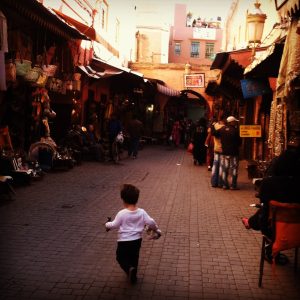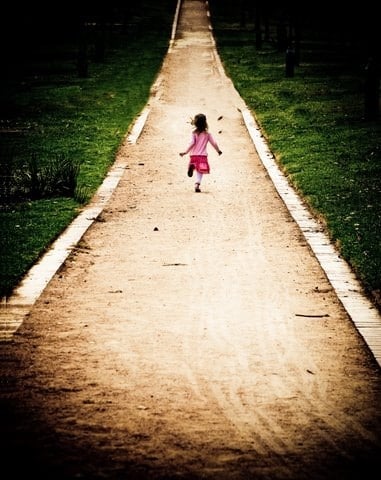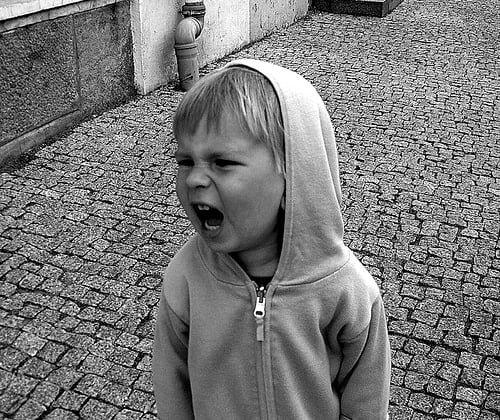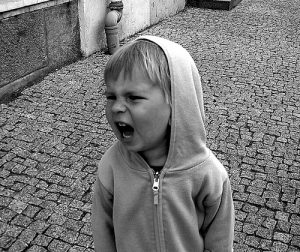by Natalia Rankine-Galloway (Morocco) | May 29, 2013 | Childhood, Economy, Expat Life, Eye on Culture, Humanity, Morocco, Parenting, Poverty, Travel
 My mom loves to tell stories about her girls…to anyone who will listen. One of her favorites is about my first plane ride home from her native Peru. At age 6, as I sat in the window seat watching Lima fade away beneath us, I turned to her and said (with wisdom far beyond my years my mum will add) “the trouble with Peru is that the Peruvians don’t take good care of it.”
My mom loves to tell stories about her girls…to anyone who will listen. One of her favorites is about my first plane ride home from her native Peru. At age 6, as I sat in the window seat watching Lima fade away beneath us, I turned to her and said (with wisdom far beyond my years my mum will add) “the trouble with Peru is that the Peruvians don’t take good care of it.”
Admittedly it is one of her less embarrassing stories, better by far than the one that has me passing most of a Greek holiday with a potty on my head. And lately, as my son gets older, I’ve been thinking more about it.
By the time we leave Morocco this fall, he will not quite be three. Throughout our time here, that fact made me sad. There is likely little if anything that he will remember about our year in Morocco and our travels in North Africa. But now, this has also made me slightly grateful.
I have started to see the cogs turning in his little head when we pass the women begging on the street, with toddlers his age strapped to their backs. I see him watching the kids selling cartons of tissues at the stop lights as I guiltily roll up the window.
As his little eyes observe more and more I am starting to be glad that we will leave before the questions start. He hasn’t progressed much past the basic two-word toddler interrogatives: dada gone? more biscuit? But I am imagining the questions forming, and I need more time to come up with good answers.
When he asks me about these babies on their mothers backs, or the ones selling on streets, what do I say? Moreover, how do you explain your own role in the perpetuation of this inequality. How do I explain that being asked for the 19th time in one day to spare just 1 dirham irritates me more and more in spite of the fact that had I given one each time, I would now be short only $2? How would I explain that the shoes he’s wearing would cover our gardeners weekly salary?
Observant though I might have been at age 6 about the socio-economics of Peru, it did not give me any head start on figuring out any actionable recommendations for the Peruvians about how to improve their problems of poverty, inequality, pollution. Nor do I have any for Morocco now, some 25 years later.
I am a big believer in my own and my son’s capacity to save the world. I take part in fundraising campaigns, donate to charity and volunteer. I will always encourage him to live a life of tolerance, patience and understanding. But when you live in the midst of an unequal society – to what extent are you compromising your principles by continuing to live in the manner to which you are accustomed?
So while I doubt that I will ever come up with any Nobel Peace prize winning solutions to global income inequality myself, I would at the very least time to come up with a way of explaining poverty to my son. I would like to be able to explain to him that he is lucky without teaching him conceit or entitlement. I would like to teach him that our relative wealth comes with a responsibility to those less fortunate in such a way that empowers and doesn’t leave me stinking of rank hypocrisy when I look away from the outstretched hands on the street.
How do you teach your children about income inequality when you are living on the “have” side of an unequal society?
This is an original post to World Moms Blog by our contributor, Natalia Rankine-Galloway, who writes at The Culture Mum Chronicles. She is now writing from the U.S. Embassy in Morocco.
Photo credit to the author.

Natalia was born a stone's throw from the Queen's racetrack in Ascot, UK and has been trying to get a ticket to the races and a fabulous hat to go with it ever since. She was born to a Peruvian mother and an Irish father who kept her on her toes, moving her to Spain, Ireland and back to the UK before settling her in New York for the length of middle and high school. She is still uncertain of what she did to deserve that.
She fled to Boston for college and then Washington, D.C. to marry her wonderful husband, who she met in her freshman year at college. As a military man, he was able to keep her in the migratory lifestyle to which she had become accustomed. Within 5 months of marriage, they were off to Japan where they stayed for a wonderful 2 and one half years before coming home to roost. Baby Xavier was born in New York in 2011 and has not slept since.
A joy and an inspiration, it was Xavier who moved Natalia to entrepreneurship and the launch of CultureBaby. She has loved forging her own path and is excited for the next step for her family and CultureBaby.
Natalia believes in the potential for peace that all children carry within them and the importance of raising them as global citizens. She loves language, history, art and culture as well as Vietnamese Pho, Argentinian Malbec, English winters, Spanish summers and Japanese department stores...and she still hopes one day to catch the number 9 race with Queen Liz.
You can find her personal blog, The Culture Mum Chronicles.
More Posts

by hjunderway | May 20, 2013 | Being Thankful, Child Care, Childhood, Cultural Differences, Education, Expat Life, Family, France, International, Language, Life Lesson, Living Abroad, Motherhood, Multicultural, Parenting, Preschool, Relocating, World Motherhood, Younger Children
 Looking back to my pregnancy as an almost mom to my one and only son, I literally had everything prepared for the first nine months of his life before his eyes ever saw the outside world.
Looking back to my pregnancy as an almost mom to my one and only son, I literally had everything prepared for the first nine months of his life before his eyes ever saw the outside world.
Diapers and clothing gently washed and neatly lined up by size, ready for each growth spurt, each passage from newborn to infant and beyond. I bought “What to Expect….” for the first three years of his existence, pouring over every detail and mentally preparing myself for each developmental stage. I was ready for it all.
My planning served me well for the first three years of my son’s life, and then we up and decided to move to a foreign country. The “What to Expect” books were packed away in long-term storage in the United States, and along with it, my sense of direction as a mother.
We have spent the last year attempting to navigate our way through life in France when French isn’t your primary language, when there aren’t any grandparents to lend a hand, and when all that is familiar becomes a distant dream.
When we arrived in France, my son was 2 years, five months and together we plowed through understanding new social norms, French cuisine, and more recently, the education system.
We did this without a manual, and did okay without it. There were times when I just wanted to type in “raising an American boy in Paris” in Google to look for tips and clarity on what we were doing wrong (or right). If there had been a manual or how-to book, I would have read it 1,000 times and given copies to all of my new expatriate friends with children.
I wasn’t sure that we were doing right by our son when we entered him into a French school at age three (standard practice in France), when the teachers and students couldn’t even pronounce his name correctly. I wasn’t sure that we were doing it right when potty training took a huge deviation and we faced mounting laundry that took forever to dry on racks in our living room.
I know I wasn’t sure that we had done right by our son when he had a meltdown at a friend’s playgroup,hitting and kicking anyone and everyone who came into his path. When I had to pack him up early and head home, I may have had a meltdown myself. Again and again, I was looking for grand gestures in my son’s behavior as proof that he was adjusting appropriately to living in a new country, and I couldn’t find any.
Why do we always look for the grand gestures? Without a guide, we often get caught up looking for the big things and forgetting to spot the small ones.
For example, at 6 months of age, I knew that my son wasn’t able to crawl because he hadn’t developed enough upper body strength to support his head, which was off the charts developmentally. I knew this because the books and doctors told me so, and therefore I had an appropriate course of action to get him back on track. Having a guide instilled in me a parenting confidence that I knew my son and that we were doing everything right, but by whose standards?
Now, a year later and closer to preschool age than that of toddler, I find myself discovering more and more of the small indications that my little one is doing just fine transitioning in our new life abroad. I see it when my son doesn’t realize I’m watching and instead of saying, “Look, look!” with excitement, he yells out, “Regarde, regarde!” (Look in French.)
I see it when he stops to hug a strange toddler crying in the playground, or when he asks me if we can take an airplane home to see his grandparents and cousin. I see it when he takes my hand to cross the street but instead of letting go immediately, he gently slides his thumb repeatedly across my knuckles, something I’ve done to him a thousand times. As time goes on, he becomes more and more self-assured and more at home being who he is. And no manual could have prepared me for that.
Has there been a time when a manual or how-to book couldn’t help you effectively parent your child through a unique situation?
This is an original post to World Moms Blog by Jacki, an American expatriate mother living in Paris, France.
The image used in this post is credited to the author
Jacki, or “MommaExpat,” as she’s known in the Internet community, is a former family therapist turned stay-at-home mom in Paris, France. Jacki is passionate about issues as they relate to mothers and children on both domestic and international scenes, and is a Volunteer Ambassador for the Fistula Foundation. In addition to training for her first half marathon, Jacki can be found learning French in Paris and researching her next big trip. Jacki blogs at H J Underway, a chronicle of her daily life as a non-French speaking mom in France.
More Posts

by Sophie Walker (UK) | May 13, 2013 | Being Thankful, Childhood, Cooking, Family, Food, Home, Inspirational, Life Balance, Motherhood, Parenting, Sophie Walker, Traditions, UK, World Motherhood, Younger Children
 The sun is shining through the trees at the bottom of the garden and dancing dappled light on the kitchen window. It gilds the pot of basil on the sill and warms our faces and illuminates the dust of flour in the air around us as Betty bends to her task.
The sun is shining through the trees at the bottom of the garden and dancing dappled light on the kitchen window. It gilds the pot of basil on the sill and warms our faces and illuminates the dust of flour in the air around us as Betty bends to her task.
She stands sturdily beside me, elevated on a kitchen chair, wrapped in a bright plastic apron. I have tied her hair up – though untidy tendrils still make their way across her cheek – and as she leans over to check her progress I have to resist the urge to kiss the perfect dimple in the nape of her neck.
Betty and I are baking. With nimble little fingers she is sieving the flour and baking powder, tap-tapping it against her palm like a tambourine and watching the clouds of white fall into the bowl. From time to time she looks up at me and grins, exposing the sweetly crooked front tooth that is the result of falling on her face mid-dash down the garden path a year ago. Betty does everything at a dash: most of her toys have to have wheels just to keep up with her. But today, she is by my side and she stays there. It’s Wednesday: our baking day, the day I don’t go to work. So here we are, elbow to elbow, delighting at our creations and the alchemy we work.
This is just as new to me as it is to Betty. I have always cooked, rarely baked. I have produced breakfasts, lunches, dinners; steaming layers of lasagne (“with GREEN pasta, Mummy!”); round, ripe tomatoes stuffed with rice; home-made turkey burgers with a secret parcel of melted cheese inside; roast chicken, roast lamb, roast beef; fat, gleaming omelettes; pancakes on feast days and naughty nuggets and chips on holidays and just-because-we-can days. But baking: that was for people who had time. I provided proudly but quickly and efficiently and then I got on with the next thing on my list.
What Betty and I do now is different. I watch her tap the egg oh so carefully on the rim of the mixing bowl before gripping it with both her little thumbs and attempting to prise it apart. Her approach is not working, so she grips it harder with her little fist and the egg crunches and splatters into the creamy whiteness of the blended butter and sugar. She makes a sound of consternation and looks up at me. I laugh, and she relaxes, and together we pick out the bits of shell. We are both learning to be patient, to enjoy the process as much as the outcome. She is so entranced by what happens when she stirs the ingredients together that she forgets to fidget and want to run. I am so entranced by her absorption that I forget to worry about what’s next on the list.
Week by week we work our way through her favourites. My baby daughter has my heart already but week by week I give it to her all over again in every offering: tender yellow vanilla-scented cupcakes that she decorates with butterflies; sturdy banana and cherry loaf; chocolate chip cookies that expand so alarmingly while cooking that we shriek and slam the oven door shut quickly and giggle. We make flapjacks, shaking oats and raisins into the mixing bowl and I smile to see her eyes widen and her hand wobble at the weight of the golden syrup we spoon in next, inhaling the bitter metal smell of the glutinous mass, our mouths watering.
Sometimes Betty gets tired and pushes the bowl back over to me to mix. Sometimes she rests her head against my side and curls a small arm around my back, sucking the first two fingers of her other hand as she watches me turn the mixture over and again and back on itself until the lumps are gone and the components blended. Then she stirs to help me transfer it into multicoloured cases, or buttered tins, before setting about licking the spoon clean, rosy pink tongue lapping like a kitten’s.
When our cakes are baked and ready, our kitchen smells of love.
This is an original post to World Moms Blog from our contributor in the UK and mum to 2 daughters and to 2 step-sons, Sophie Walker.
The image used in this post is credited to the author.

Writer, mother, runner: Sophie works for an international news agency and has written about economics, politics, trade, war, diplomacy and finance from datelines as diverse as Paris, Washington, Hong Kong, Kabul, Baghdad and Islamabad. She now lives in London with her husband, two daughters and two step-sons.
Sophie's elder daughter Grace was diagnosed with Asperger Syndrome several years ago. Grace is a bright, artistic girl who nonetheless struggles to fit into a world she often finds hard to understand. Sophie and Grace have come across great kindness but more often been shocked by how little people know and understand about autism and by how difficult it is to get Grace the help she needs.
Sophie writes about Grace’s daily challenges, and those of the grueling training regimes she sets herself to run long-distance events in order to raise awareness and funds for Britain’s National Autistic Society so that Grace and children like her can blossom. Her book "Grace Under Pressure: Going The Distance as an Asperger's Mum" was published by Little, Brown (Piatkus) in 2012. Her blog is called Grace Under Pressure.
More Posts

by Kyla P'an (Portugal) | May 3, 2013 | Childhood, Culture, Family, Feminism, Girls, Kids, Life Lesson, Motherhood, Parenting, School, Social Media, USA, World Motherhood, Younger Children
 Not long ago, I attended a parenting seminar featuring excellent keynote speakers and a number of child development specialists. The seminar must have impacted me more than I realized because this is the second time I find myself writing about sage wisdom imparted during it (the other time I brought it up was in this post).
Not long ago, I attended a parenting seminar featuring excellent keynote speakers and a number of child development specialists. The seminar must have impacted me more than I realized because this is the second time I find myself writing about sage wisdom imparted during it (the other time I brought it up was in this post).
A major topic of the keynote address centered on how US parents today are getting more involved with their children, sometimes to a detrimental degree.
Most US women of my generation, Gen X—as products of mothers that fought for equality and women’s rights back in the 1960’s—are more accomplished, both academically and professionally, than our fore-mothers. After obtaining college and often graduate school degrees (sometimes more than one), Gen X women go on to establish our financial independence in the workforce; and in many cases, then elect to leave the workforce in order to raise children.
This trend is called “Opting-Out” and it’s common in tony suburbs around the US. But it’s a trend with consequences. Women, who had achieved success professionally find themselves somewhat under-challenged domestically. Eager to apply their professional talents at home, many of these women turn child rearing into a second career. Though fathers are not as likely to Opt Out, some still do, leaving the mother as main bread winner. As a result, helicopter and over-bearing parenting has become ubiquitous; the outcome of which has yielded a population of coddled and unresilient kids.
I am not claiming this phenomenon endemic to the US but it’s certainly a growing concern. Perhaps this is why the message in the parenting seminar’s keynote address by Robert Evans resonated so much for me. He spoke about how today’s parents are so focused on their kids that they are willing to do everything for them: intervene at the slightest sign of trouble; help them with projects and homework the children should be responsible for; even criticize teachers and authority figures for treating their child unfairly. In essence, these parents are clearing life’s path of all obstacles and challenges that would help a child build character, resilience and stamina.
“Parents don’t need to prepare the path for their children…instead, they need to focus on preparing their children for The Path.”
– Bob Evans
Preparing our children for the path…what does that mean exactly? And where do we draw the line?
I would not label either my husband nor myself a helicopter parent—Drill Sargent, perhaps–but as a freelance writer with a flexible work schedule, I avail myself to my children and their school and activity schedules. I’m a room parent, active member of the Parent/Teacher Organization and volunteer for many roles at my children’s schools and extra-curricula. But I don’t think I over-do it.
At my daughter’s elementary school, there’s a rumour that the teachers have an acronym for the (mostly female) parents who should get out of the school and get a job. I don’t know what the acronym is and pray it’s never associated with my name but I can understand why it exists.
In parents’ defense, however, we can’t help feeling more protective and sometimes over-bearing about our kids. We want to be able to let go of their hands and let them find their own way but there are a lot more demons along the path now. Social media, for one, has rendered our lives more public than ever before. I often find myself more concerned about the fall-out of a misstep on Facebook than a misstep in real life. Take for example the recent milestone our daughter achieved, which I was initially so proud of but ultimately never posted online about:
Our house is a half-mile away from our elementary school. To get there, you walk along a lovely open path along a ridge, down the hill across the soccer fields and arrive at the school. You can see the school from the top of our street. My children and I have been walking to school along this path, which we dubbed the Faery Path, for four years now. Recently, we allowed our independent 1st- grader to walk to school on her own. There are other kids in our neighborhood who also walk to school but none of them without a parent. For this reason, I got nervous about it.
I wasn’t nervous for our daughter, she’s a very capable and spunky 7-year-old, I was nervous for what others would think about my decision to let her walk alone; how they would judge my parenting style.
Later that day, when I picked my daughter up from school, she effervesced about how exciting it was to walk to school on her own and how responsible it made her feel. With heavy-heart, I informed her that it was the only time she would get to walk the path on her own for a while.
It’s just not how today’s parents are doing things.
How do you help prepare your children for the Path? Do you feel the judgement of others has a negative outcome on your child rearing decisions?
This is an original post to World Moms Blog by Senior Editor and mother of two, Kyla P’an.
The image used in this post is credited to Nina Mathew’s Photography. It holds a Flickr Creative Commons attribution license.
Kyla was born in suburban Philadelphia but spent most of her time growing up in New England. She took her first big, solo-trip at age 14, when she traveled to visit a friend on a small Greek island. Since then, travels have included: three months on the European rails, three years studying and working in Japan, and nine months taking the slow route back from Japan to the US when she was done. In addition to her work as Managing Editor of World Moms Network, Kyla is a freelance writer, copy editor, recovering triathlete and occasional blogger. Until recently, she and her husband resided outside of Boston, Massachusetts, where they were raising two spunky kids, two frisky cats, a snail, a fish and a snake. They now live outside of Lisbon, Portugal with two spunky teens and three frisky cats. You can read more about Kyla’s outlook on the world and parenting on her personal blogs, Growing Muses And Muses Where We Go
More Posts - Website
Follow Me:


by World Moms Blog | Apr 24, 2013 | Childhood, Communication, Family, Guest Post, Health, Human Rights, Inspirational, International, Interviews, Living Abroad, Motherhood, Relocating, Shot@Life, Traditions, United Nations, Vaccines, Working Mother, World Events, World Moms Blog, World Motherhood, World Voice, Younger Children
For the past two years, World Moms Blog and many of our global contributors have been deeply engaged with and committed to the mission of the UN Foundation’s Shot@Life campaign.
In recognition of World Immunization Week and in celebration of the official launch of the Shot@Life campaign a year ago today, World Moms Blog is proud to introduce you to global Champion, Courtney Diesel O’Donnell.
 World Moms Blog: Where do you live and are you from there?
World Moms Blog: Where do you live and are you from there?
Courtney O’Donnell: I live in Berlin, Germany. I moved to Berlin a little over a year ago with my family. My husband is originally from Germany, but it’s my first time living here. Berlin is a fascinating city – full of history, remembrance and rebuilding. Today, in addition to government and other industry there is also a thriving art culture here.
Yes, I am a mom of two boys, ages 4 and 2.
What did you do before becoming a mom? Do you still do that?
I have worked for many years in the communications field – for political candidates, non-profit groups, and also corporations. I still work in this capacity as a consultant to various organizations.
How did you learn about Shot@Life?
I became aware of Shot@Life through social media and a friend who began working with the UN Foundation.
Why did you become a Shot@Life Champion? (more…)
World Moms Blog is an award winning website which writes from over 30 countries on the topics of motherhood, culture, human rights and social good. Over 70 international contributors share their stories from around the globe, bonded by the common thread of motherhood and wanting a better world for their children.
World Moms Blog was listed by Forbes Woman as one of the "Best 100 Websites for Women 2012 & 2013" and also called a "must read" by the NY Times Motherlode in 2013. Our Senior Editor in India, Purnima Ramakrishnan, was awarded the BlogHer International Activist Award in 2013.
More Posts

by Angela Y (USA) | Mar 27, 2013 | Childhood, Younger Children
 Little Girl at almost age 3 and is just starting to form sentences and phrases. Big Girl at age 5 has a good grasp of the English language including many popular slang words and phrases. When I hear Big Girl use slang phrases in correct context with emotion, I often wonder where she gets them? Do you know where? The answer is obvious.
Little Girl at almost age 3 and is just starting to form sentences and phrases. Big Girl at age 5 has a good grasp of the English language including many popular slang words and phrases. When I hear Big Girl use slang phrases in correct context with emotion, I often wonder where she gets them? Do you know where? The answer is obvious.
From me. Most of the time. But not always.
Recently Big Girl’s response to any request I made that she either didn’t want to do or like to do was “Whatever Mom!” It was irritating. I cringed every time she said it. And I thought, “Where did she get that?” And then I heard myself say it. With the same tone and in similar context. I am working to rid my response of, “Whatever!” and sure enough, the times I hear it from her have decreased.
Then there are the rouge phrases that Big Girl picks up from television cartoons. One day her response to me was, “Duh! Boring!”. I KNOW I don’t say that! Turns out that it is a favorite phrase of a little pink pony. (more…)

Angela Y. is in her mid-thirties and attempting to raise her two daughters (big girl, R, 3 years; little girl, M, 1 year) with her husband in San Francisco, CA. After spending ten years climbing the corporate ladder, she traded it all in to be a stay-at-home mom! Her perspective of raising a child in the city is definitely different from those who have been city dwellers all their lives, as she grew up in rural Northeastern Pennsylvania (NEPA) surrounded by her extended family.
Angela Y. and her husband are on their own on the west coast of the United States — the only family help they receive is when someone comes for a visit. But, the lifestyle in San Francisco is like no other for them, so there, they stay! This exercise conscious mom is easily recognized, especially when she is riding around her husband-built bike with two seats on the back. And, when she’s not hanging out with the girls, you can find Angela Y. in the kitchen. She loves to cook for her family, especially dessert, and then eats some herself when no one is looking! Sneaky, mom!
More Posts
 My mom loves to tell stories about her girls…to anyone who will listen. One of her favorites is about my first plane ride home from her native Peru. At age 6, as I sat in the window seat watching Lima fade away beneath us, I turned to her and said (with wisdom far beyond my years my mum will add) “the trouble with Peru is that the Peruvians don’t take good care of it.”
My mom loves to tell stories about her girls…to anyone who will listen. One of her favorites is about my first plane ride home from her native Peru. At age 6, as I sat in the window seat watching Lima fade away beneath us, I turned to her and said (with wisdom far beyond my years my mum will add) “the trouble with Peru is that the Peruvians don’t take good care of it.”














